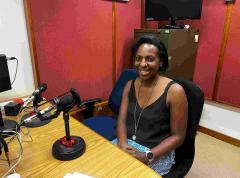簡介
主持人:Lok Man Leung - Programme Manager at the Hong Kong AIDS Foundation
Listen to #Hashtag Hong Kong every Sunday morning at 8.15
Focussing on issues affecting civil society, we'll hear from representatives of NGOs, associations, statutory bodies, and non-profit groups.
(Sundays 8.15am - 8.25am)
最新

Deanna Kwok - Head of Programmes at Love21 Foundation
April 2nd is World Autism Day, a day to raise awareness and promote acceptance and inclusion for individuals on the autism spectrum. According to recent studies, autism affects approximately 1 in 36 children globally, and Hong Kong is no exception—there has been a steady increase in autism diagnoses over the past decade. Meanwhile, Down syndrome is one of the most common genetic disorders, occurring in around 1 out of 700 births worldwide.
One of the biggest challenges faced by the individuals with autism and Down syndrome in Hong Kong is the lack of accessible support services. The shortage of trained staff equipped with the SEN knowledge and skills and the lack of suitable facilities make it challenging for the community to engage effectively in physical activities that promote their health and development.
Factors such as low motivation levels and social anxiety can act as significant barriers, exacerbating their conditions and potentially isolating themselves socially.
What’s more, caregivers and parents, too, experience high levels of stress, as the demands of caregiving are immense and often go unrecognized.
At Love 21 Foundation, we saw how much the Neurodiverse community in Hong Kong were held back by stigma and lack of opportunity. Our goal is to empower our community members with opportunities to reach their full potential through sports, nutrition, and holistic support programmes. Our strengths-based approach, together with our personalized and tailored programmes, motivate each of our members and their families to take ownership of their health.
Currently serving over 500 families, we provide support based on the six pillars of our holistic model:
1. Sport and Fitness - We provide over 500 sports and fitness activities to members and their parents every month. Led by experienced coaches and instructors, our diverse activities ranges from dancing, bocce, boxing, circuit training, dragon boat racing to yoga. We even have competitive teams programme for members who are dedicated to improving their skills and potentially represent Love 21 in internal and external competitions.
2. Nutrition and Dietetics – Members in the neurodiverse community have genetic predispositions that put them at a higher risk of disease such as obesity and diabetes. Combining with our fitness programme, we provide continued support to members through regular dietitian consultations along with fitness classes, as well as nutrition classes, cooking demonstrations and seminars.
3. Enrichment and Intervention – Other than sport and fitness activities, we also offer therapeutic classes such as art and music therapy sessions for our members. These classes are held with smaller teacher-student ratios where members can enjoy a more quiet and therapeutic space or for those who require closer care and attention.
4. Family Support - Our parent beneficiaries play a huge role in our classes and out. We do all we can to support the parents and their children such as offering counselling sessions, parent-only and family specialty classes, peer support groups, as well as employment opportunities for our members.
5. Community – We help our members and families to integrate into society by providing volunteering and stewardship opportunities. We also bring our members to various community events and social gatherings which help members connect to the community and better integrate.
6. Education and Advocacy - We are expanding our outreach programme where we collaborate with schools, corporates, and other organizations to raise awareness and advocate for inclusivity. Our CSR programme is extremely important, reason being that our beneficiaries are rarely seen and often misunderstood. Volunteering with us enables the wider community to learn about the challenges as well as building a relationship with the neurodiverse community through participating at our regular activities and interactions.
I’d like to extend a heartfelt appreciation to our supporters who have accompanied us on this shared path for the past seven years.
We will soon be opening our third centre where we aim to expand our reach and offer a wider range of support programs especially for family services. I’d like to encourage everyone to get involved—whether it’s volunteering, raising awareness, or simply being more inclusive in your daily life. Together, we can create a society where everyone feels valued and empowered to shine.
And the song I'd like to dedicate to our community members and caregivers is "Not so different" by Cassandra Kubinski.























